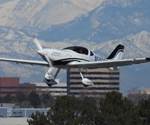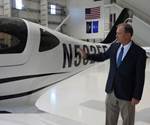Bye Aerospace begins next flight test phase for eFlyer 2
The next flight test phase for the eFlyer 2 focuses on selecting the most effective propeller that meets lightweight and efficiency requirements.

Source | Bye Aerospace
Bye Aerospace (Denver, Colo., U.S.), a company developing FAA 23-certified general aviation all-electric aircraft, announced on June 22 that it has begun the next phase of its flight test program for the composites-intensive, two-seat, all-electric eFlyer 2 technology demonstrator. Bye Aerospace aims to make its eFlyer family of aircraft the first FAA Part 23-certified, practical, all-electric airplanes to serve the flight training, air taxi and general aviation markets.
George E. Bye, CEO of Bye Aerospace, notes that the flight test program is focused on collecting flight envelope engineering data for the three propellers being considered for the FAA-certified production version of eFlyer 2. The criteria for selecting the confidential propeller finalists includes the propeller’s lightweight requirement and the propeller’s aerodynamic design evaluated against the eFlyer 2’s flight training mission.
“Data from these flight tests will help our engineering team determine the most efficient propeller that will maximize the overall efficiency for the typical flight training syllabus requirement,” Bye says. “The prototype Rolls Royce electric motor currently on the eFlyer 2 technology demonstrator has varying torque and a large RPM range with a relatively small size and cross-section compared to a conventional internal combustion engine. Therefore, more of the propeller length is available to provide thrust across a broad range of RPM. As a result, we will be conducting flight tests with the various propellers over the summer against these electric propulsion criteria.”
In addition to return to flight testing, Bye says the critical design review (CDR) for eFlyer 2 was completed June 5, a significant milestone in the FAA Part-23 certification process. “The Covid-19 pandemic has forced Bye Aerospace to communicate and collaborate remotely like everyone else, but we have continued to move forward in our certification process as safely, economically and efficiently as possible,” he says. “During this series of flight tests in particular, we are closely managing the number of participants to observe physical distancing and other recommended safety practices.”
Related Content
-
Optimizing a thermoplastic composite helicopter door hinge
9T Labs used Additive Fusion Technology to iterate CFRTP designs, fully exploit continuous fiber printing and outperform stainless steel and black metal designs in failure load and weight.
-
Carbon fiber, bionic design achieve peak performance in race-ready production vehicle
Porsche worked with Action Composites to design and manufacture an innovative carbon fiber safety cage option to lightweight one of its series race vehicles, built in a one-shot compression molding process.
-
Active core molding: A new way to make composite parts
Koridion expandable material is combined with induction-heated molds to make high-quality, complex-shaped parts in minutes with 40% less material and 90% less energy, unlocking new possibilities in design and production.












